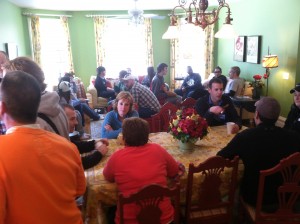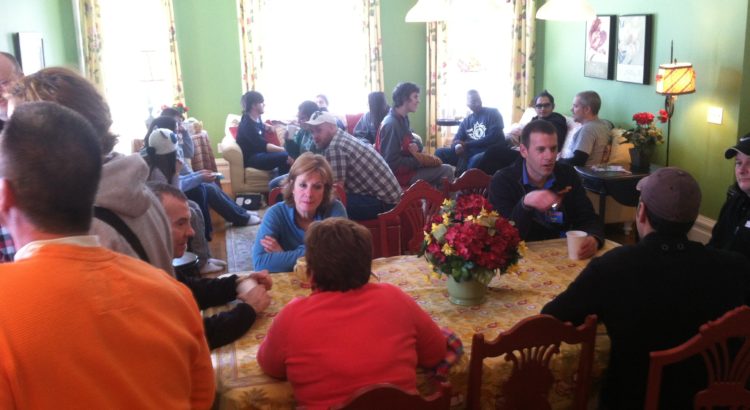 During the course of the year, we have opportunity to serve hundreds of churches from dozens of denominations. These churches come to camp to participate in programs, or host programs of their own. They invest significant resources of time, energy and money to make those programs happen.
During the course of the year, we have opportunity to serve hundreds of churches from dozens of denominations. These churches come to camp to participate in programs, or host programs of their own. They invest significant resources of time, energy and money to make those programs happen.
On Saturday afternoons during our Winter Teen Retreats, we invite them for some fresh brewed coffee and an opportunity to take their snow boots off and relax for a few minutes in our guest house. Originally planned as a one-hour meet-and-greet, these gatherings often extend three hours as leaders share ideas, meet other youth pastors, and just talk about life and ministry.
These times have helped me realize with even more clarity that these church leaders and churches are not our patrons, they are our partners. I have always said it in our Friday night leaders’ meetings, that it would be a boring weekend without them and their students, and it really is true.
As an organization and ministry, we don’t exist for ourselves. We exist primarily to glorify God through the ministry we have to young people. And we have realized that the best way to reach those young people is through the connections they already have to churches, ministries and organizations—the ones these leaders represent.
This focus has several distinct advantages.
It provides a natural connection for students to adults they already trust.
Maslow’s Hierarchy of Needs identifies the basic needs of individuals as physiological, then for safety, belonging, esteem and finally self-actualization. When teens and young adults participate in a shared experience at camp, away from their regular surroundings but together with people they trust, they learn to lean on those people more strongly.
With trusted leaders alongside them, the safety that their friends and peer group provides, and the esteem developed through conquering fears on challenging activities, they fast-track to a place where they can consider deeper needs. They are able to focus on their own meaning, purpose and relationship with God. It’s part of the reason I believe retreats are such an effective vehicle through which children and teens make significant spiritual decisions.
It ensures regular, effective follow-up for them once they go home.
While we may be able to provide great programming and engage talented speakers and musicians, it would be extremely difficult to provide any kind of effective follow-up to individual campers on our own once they leave our property.
Instead, the natural and logical (even Biblical) alternative is to connect them with a local church that can provide discipleship and community year-round. For retreat campers—who came to camp with a church from their area, and likely with people from their school—there is a tremendous opportunity for those churches to continue to minister once the mountain-top experience has ended.
It allows those churches and ministry leaders to focus on what they do best.
Last week I spent some time debriefing with a large church that had joined us at camp for the first time to participate in one of our programmed retreats. He said how the experience was so different from other years—where he had been responsible for teaching, activities, and lots of details. This year, he was able to focus on supporting his adult volunteers and investing in relationships with the students he had brought.
The churches we partner with are able to eat, walk, play, worship and grow alongside their students without having to think about the details. Sure, they still lead small groups. They still have to coordinate transportation and permission slips. They still have to get kids to camp. But once they’re there, our hope is that they will just get to spend time with them, in meaningful conversation and playing in the great outdoors.
That leader I debriefed with… he said something like, “We could have done a lot of this on our own. In fact, we did in previous years, but I don’t know that it could have been any more effective. Plus, we wouldn’t have gotten to spend so much time hanging out with our students and leaders.”
As a ministry, we see tremendous value in supporting the local churches and ministries who spend 51 weekends a year with their students at home. And, during their one weekend with us, we hope to encourage and strengthen them in their relationships with God and with one another. That’s what it means to be partners.
